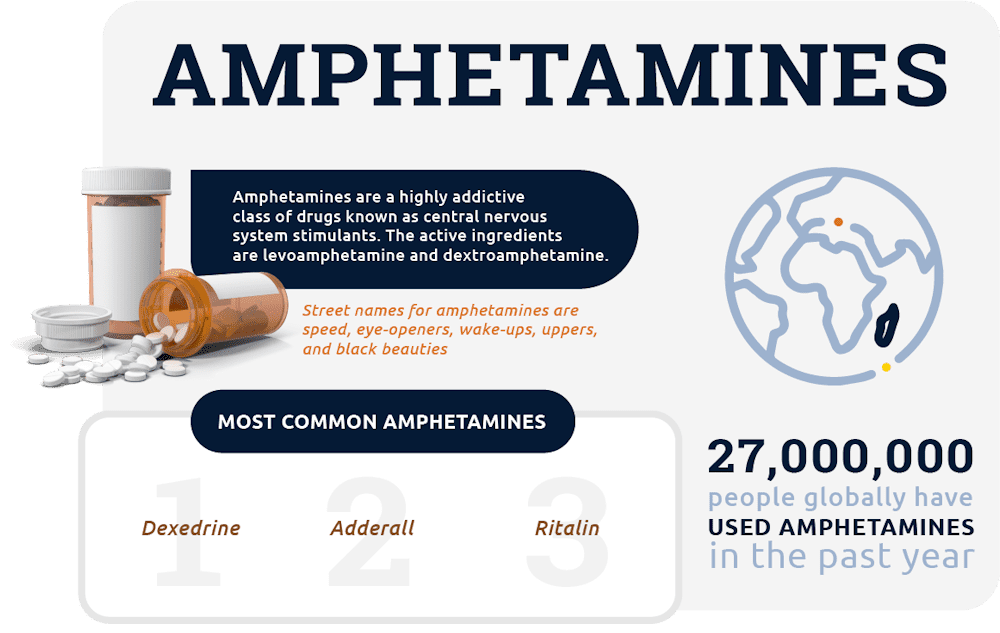An affordable amphetamine addiction rehab center in Northern IL that offers dual diagnosis treatment can help you or a family member quit amphetamine. Some of the commonly abused prescription amphetamines may be in your medicine cabinet. These drugs are responsible for addiction in millions of American men and women between ages 18 and 26. Instead of trying to quit on your own, the medical and mental health professionals at Northern Illinois Recovery can help you to safely come off medication.
What are Amphetamines?
Amphetamines are a highly addictive class of drugs known as central nervous system stimulants. The active ingredients are levoamphetamine and dextroamphetamine. Doctors legally prescribe the medications to patients. However, some people convert them to illicit use. Street names for amphetamines are speed, eye-openers, wake-ups, uppers, and black beauties. Drug labs also use amphetamine to make the illegal drug methamphetamine (crystal meth.)
List of Commonly Abused Prescription Amphetamines

Amphetamines come as tablets, capsules, or liquid forms. The following is a list of commonly abused prescription amphetamines. They have a high potential for abuse.
- Dextroamphetamine (Dexedrine®)
- Combination dextroamphetamine/amphetamine (Adderall® and Ritalin XR)
- Methylphenidate (Ritalin® and Ritalin-SR®)
These drugs are usually prescribed to treat attention deficit disorder (ADD), attention deficit hyperactivity disorder (ADHD), and narcolepsy in children and adults.
Amphetamine Effects on the Brain
The commonly abused prescription amphetamines work by speeding up brain functions in patients being treated for ADHD, ADD, or narcolepsy. However, some people, including college students and athletes, misuse amphetamines to boost energy, enhance focus, or improve performance.
On the other side of the high is the “crash”, which happens when the drug leaves the body. Unpleasant withdrawal symptoms develop as a result making it difficult to get off the stimulant. Continued use also increases the activity of the chemicals dopamine and norepinephrine in the brain.
Amphetamine Effects on Health
 Amphetamine abuse occurs when someone misuses it. This includes taking it in a way other than directed, taking someone else’s prescription, or taking the medicine purely for euphoria (recreational use). Abuse causes you to want more of the drug as tolerance develops over time. Some people crush the tablets for snorting or smoking. Others dissolve the capsule powder in water and inject the solution into a vein.
Amphetamine abuse occurs when someone misuses it. This includes taking it in a way other than directed, taking someone else’s prescription, or taking the medicine purely for euphoria (recreational use). Abuse causes you to want more of the drug as tolerance develops over time. Some people crush the tablets for snorting or smoking. Others dissolve the capsule powder in water and inject the solution into a vein.
This releases the drug straight into the bloodstream and increases the risk of dependency, drug addiction, and overdose. Side effects of the commonly abused prescription amphetamines depend on the frequency of use, the amount taken, and the duration of abuse. Common side effects include:
- Anxiety or depression
- Rapid or irregular heartbeat
- Mood disturbances
- Psychosis and paranoia
- High blood pressure
- Sleep problems
Increased breathing, decreased blood flow, seizures, and heart failure are other possible health effects.
Treatment for Commonly Abused Prescription Amphetamines
You or your loved one can safely withdraw from any of the commonly abused prescription amphetamines. Medication-assisted detox is available to patients who need help managing severe withdrawal symptoms such as psychosis, anxiety, or depression. This stage of treatment is done at an inpatient (residential), partial hospitalization, intensive outpatient, or drug rehab programs in illinois.
Transitioning to Therapy
Behavioral therapies, including cognitive-behavioral therapy, are evidenced-based treatments used by a master level therapist to help clients recover from amphetamine abuse. Therapy is recommended right after detox to give you the best chance at staying “clean.” The programs at Northern Illinois Recovery are designed to help you understand what makes you turn to drugs and how to manage substance use triggers. Programs include dual diagnosis therapy, extended care (90-day program), and medication-assisted treatment.
A Drug-Free Life Awaits
If you are considering getting addiction treatment at Northern Illinois Recovery, then you can expect to receive individualized care in a supportive environment. The center is located in Crystal Lake, IL, but also serves clients in the Chicago suburbs, McHenry County, and surrounding areas. Call 855.786.1978 to find out how to start the admissions process.




